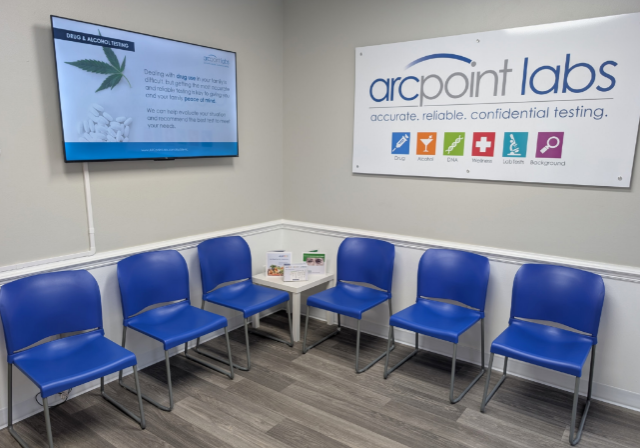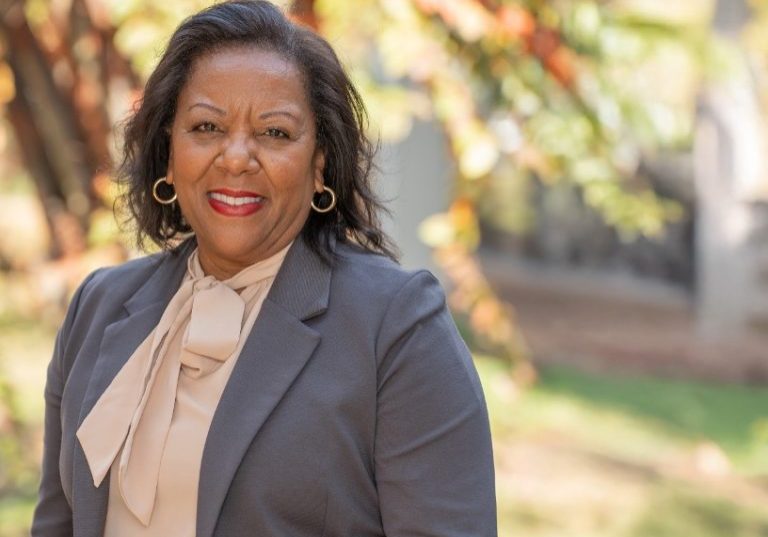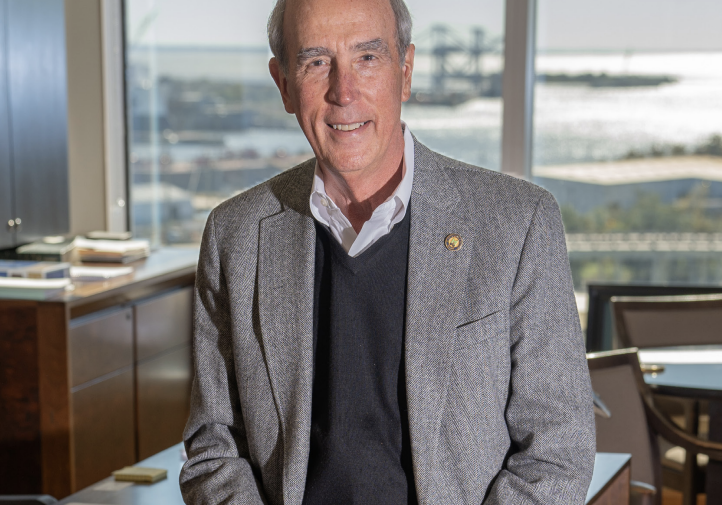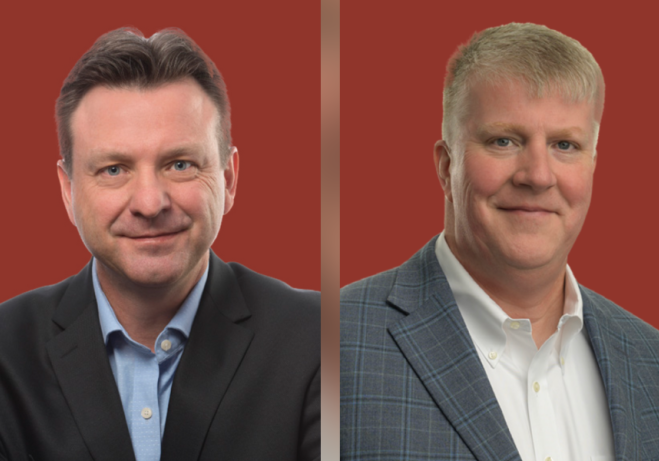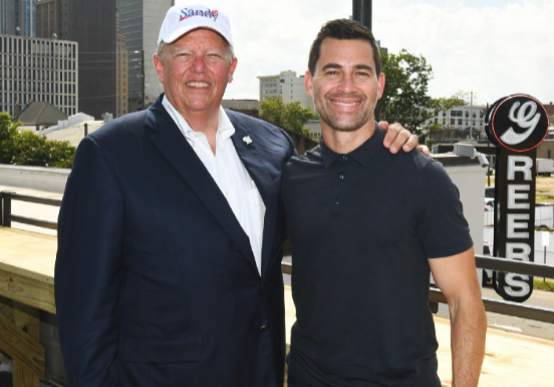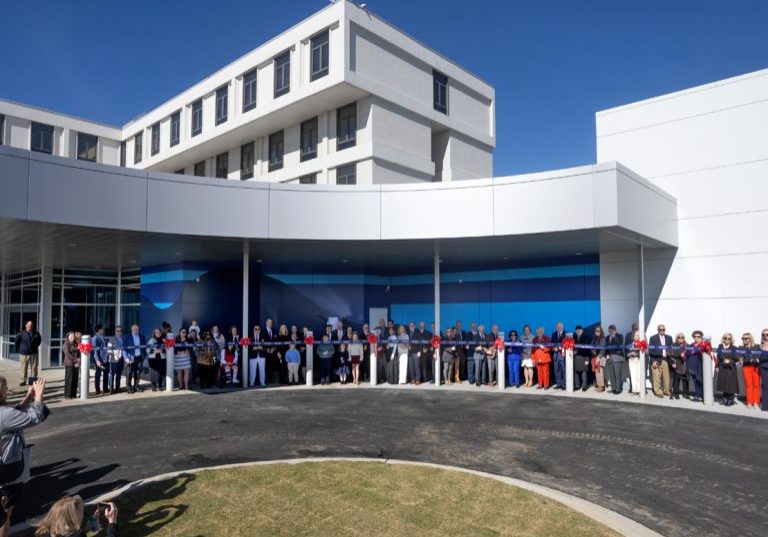Kendall Kilpatrick: CEO, Thompson Engineering
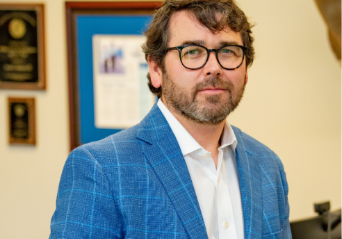
Providing direction and support for a successful team
by Lindsay Mott Fletcher
Photography by Stephen Savage
Kendall Kilpatrick joined Thompson Engineering in 2023 as executive vice president and moved to the CEO role by January 2024. As the company looks to the trends shaping the future of the industry and successfully navigates current challenges, the focus on Thompson’s employees and its core values have the company poised to take its success from 2024 into 2025 and beyond. Kilpatrick (KK) took some time to discuss all this and more with your author (LMF).
LMF: Tell me a little bit about your background and the road to your current role as CEO of Thompson Engineering.
KK: I was born and raised in Mobile. I attended John Will Elementary School (my mother was a teacher and counselor at John Will), Hillsdale Middle School and John Shaw High School. I am a product of the Mobile County Public School System. After graduating from high school, I attended Spring Hill College from 1992 to 1995 and Auburn University from 1995 to 1998. I earned a Bachelor of Science from Spring Hill College and a Bachelor of Civil Engineering from Auburn University.
Upon graduation from Auburn, I interviewed at several firms across Alabama for my first job. Ultimately, I accepted an offer from Volkert for two reasons: the job allowed me to work in the transportation design for the highways and bridges department, and it allowed me to return to my hometown of Mobile.
At Volkert, I worked on numerous projects varying in size and complexity. Among them are the Opp Bypass, Corridor X, the Montgomery Outer Loop, Grelot Road, University Boulevard, the National Center for Asphalt Technology (NCAT) Test Track at Auburn University and the Mobile River Bridge.
After a few years, I accepted a job offer at Hatch Mott MacDonald (later Mott MacDonald). Over the course of 18-plus years, my career developed from project manager, to senior project manager, to principal project manager, to sub-division manager, to division manager and ultimately to unit manager leading operations in the Southeast from Delaware to Florida to Texas. I was responsible for leading the teams delivering work in almost every market we served in that geographic footprint. That encompassed a variety of projects, from airports and commercial buildings to environmental sustainability and planning projects, to bridges, ports and rail, as well as program management.
During my time there, I also had the honor of serving our industry through leadership roles with the American Society of Civil Engineers (ASCE) and the American Council of Engineering Companies (ACEC), ultimately serving as president of both state chapters.
In January 2023, I made what some people considered to be a surprising move to Thompson Engineering, accepting a position as the executive vice president leading our Buildings and Infrastructure Practice. I was familiar with Thompson Engineering and some of its staff, but as I began to learn more about the company, I realized there’s more to Thompson Engineering than many people know.
Thompson provides a wide range of services, and I don’t think the southeastern region is aware that a firm based out of Mobile holds these capabilities and expertise. This signaled a huge opportunity for growth, and I wanted to be a part of that.
LMF: You were named CEO within a year of joining the company. Was this expected? What do your job duties entail as the CEO of a multi-disciplined engineering firm with offices in eight states?
KK: When I joined Thompson Engineering, I knew then-CEO John Baker was working on his succession plan, but my focus was on the Buildings and Infrastructure Practice. I worked closely with John to unleash untapped potential for the practice. We focused on efficiency and, really, a new way to look at managing operations. John and I could see that duplicating those efforts across the company was not only possible, but possible, quickly.
As CEO, my focus is now on providing the direction and support necessary to allow our team to be successful. If I were to translate that to job duties, I would summarize them this way:
- Developing a strategy for growth across the Southeast
- Implementing efficiencies in the way we work
- Empowering staff through training and learning opportunities
- Sharply focusing on the quality of our work
- Building on our brand and reputation within the industry
LMF: What positive changes did the company experience in your first year as CEO?
KK: 2024 has been an incredible year for Thompson Engineering, and there are a lot of reasons and a lot of people responsible for that continued success, building on the performance from 2023.
From an employee perspective, we’re hiring talented people fast and furiously. In a time when recruiting is as hard as it has ever been, people are calling us to learn about our company and what we offer. We’ve brought on subject matter experts and people with the experience and skills we need to tackle new things. These folks joined a Thompson Engineering staff who are not only great at what they do, but who are excited to do new things. There’s a lot of good energy moving us forward.
That people power is fueling an impressive performance. Through September 2024, our total net income exceeded our goal for the entire year, and that goal was an already aggressive 32% above the 2023 total net income. By October 2024, we had exceeded our 2024 net service revenue (NSR) goal by $7 million; the NSR goal for 2024 was an aggressive 15% above the 2023 NSR. While this growth is impressive, the investment it allows us to make in our people will be the key to sustainable growth of Thompson Engineering for years to come.
One of the things I get really excited talking about right now is the formation of a program to help our staff grow throughout their careers. Thompson Engineering is a group of scientists, architects, archaeologists, planners, engineers and others who want to continuously learn and excel. It’s ingrained in them.
The program is called Thompson EDGE (Engage, Develop, Grow and Empower). I firmly believe that most answers lie within an organization, and we simply need to give a voice to the people with those ideas and solutions. And we want to do this across our footprint. As we grow and expand geographically, Thompson EDGE will be a vehicle for reinforcing our culture and explaining how we do things and why we do things the way we do at Thompson Engineering.
The committee working to develop the Thompson EDGE program is doing a great job, and I look forward to the benefits it will bring, not only to our employees, but to the business. When our employees grow and improve, their ability to deliver solutions to our clients improves.
LMF: What are the main changes you’ve seen the industry face over the years? What are some of the current biggest challenges facing the industry and how are you/Thompson overcoming them?
KK: All industries evolve, and ours is no different. I’ll mention three challenges I see the industry currently facing. There is an increasing focus on the use of technology (specifically the use of machine learning and Artificial Intelligence [AI]) to improve productivity and scalability. Learning how to use this technology in a responsible way is the topic of many discussions in our industry. At engineering industry conferences, we hear about lessons learned from unintended outcomes as firms begin to use these tools and better understand the data sets that these tools rely on. Thompson Engineering is engaged and currently making use of these tools, but we are doing so cautiously.
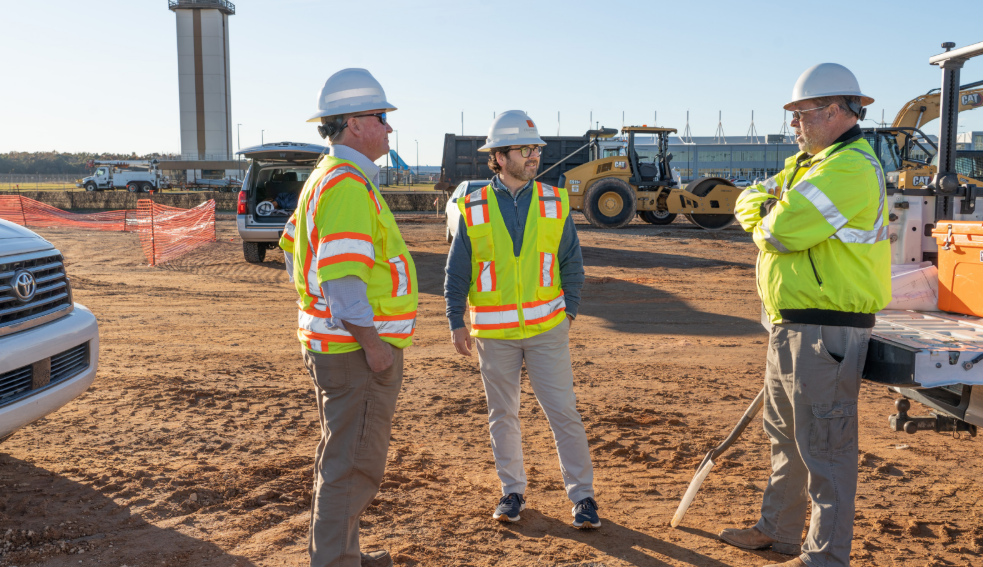
Another topic is the continued evolution of alternative delivery methods. These are typically driven by the goal of helping our clients and partners find the most efficient ways to implement or execute projects. Firms like ours can serve our clients in different ways to make this happen, such as program manager, construction manager at risk, design- build, progressive design-build and many others. Each one has its pros and cons depending on the specific circumstances of a project. Thompson Engineering is well-versed in working with clients to identify and execute the appropriate delivery model for their needs.
For example, Thompson Engineering is working with general contractor Brasfield & Gorrie on the design-build effort for the Airbus A220 Assembly Facility. From field data acquisition to design development, construction support services and project communications, we’re doing what we know best in new ways to support clients as these models evolve.
Finally, we have to talk about people resources. During the Great Recession, a lot of people getting started in our industry left to pursue other careers more in demand at the time. Today, those folks would be providing that 10-plus year level of experience. Also today, there’s a lot of funding for that experience level to push these projects forward. Unfortunately, the workforce isn’t there. That’s another reason why AI is a hot topic.
LMF: Looking ahead, what trends do you anticipate shaping the future of the engineering industry, and how is your company preparing to adapt to these changes?
KK: I have to mention machine learning and AI again. There’s no denying that, despite the challenges, it will shape the future of engineering. One of the ways Thompson Engineering has embraced it is for processing our point cloud data captured by survey scanners and drones. This cuts down on processing time and costs while improving the overall quality of the survey used by the design and/or construction team.
Another trend is incorporating sustainability and resiliency into our designs. From our perspective, that means working with the natural elements available on a project site to create an environmentally responsible design. It also involves incorporating sustainable features
— think renewable materials, energy efficiency, life cycle costs and environmentally responsible and aesthetically pleasing spaces. A lot of people assume that environmentally friendly means more expensive. We’ve learned that such designs can be more cost-effective over time.
LMF: What sets Thompson apart from other engineering firms? What specialties do your employees offer that others don’t? What makes your company successful?
KK: As I mentioned, I was surprised to learn about the variety of service offerings Thompson Engineering provides, and I think that as we work to get that message out there, it will be seen as a differentiator. There’s real value in being able to walk down the hall or pick up a phone and talk to a trusted colleague about a need that might not be your expertise but is needed to move a client’s project forward.
But, to me, when you ask what sets Thompson apart from other engineering firms, you are really asking how Thompson’s culture is different from other firms and how that benefits our employees and clients.
That answer lies in our core values, especially our core value of ownership. We define ownership as “individually taking responsibility for the results of our actions and taking the initiative to drive positive results.” That ties into the nimbleness and the spirit of entrepreneurship here. Ownership is such a powerful word. At Thompson, it means being clear about where we’re going, why we are headed there and, most importantly, how each individual in our company — regardless of the position they hold or the title they have — contributes to our goals.
LMF: Is there a memorable project that has stayed with you?
KK: The first Airbus program (Airbus A320 FAL-USA) is one I will always remember. This is the project that made Mobile, one of only a few locations in the world where commercial aircraft are built. As Airbus worked to develop and implement the program, we were there, step by step, to help them navigate the design development, bidding and construction support. I felt like I was part of something larger than the project itself, something that would significantly impact the Mobile community for future generations.
That’s what I look forward to for Thompson Engineering staff — the opportunity to positively impact their communities in big ways. The opportunities are there. From the exciting things happening at Austal and with the Mobile River Bridge to rebuilding efforts in North Carolina following Hurricane Helene or energy production in Texas, that’s why the engineering industry is a rewarding place to work. Our work really does impact people’s lives.
LMF: What do you hope your legacy will be when your time at Thompson comes to an end?
KK: Engineering firms are often a behind-the-scenes supporter of their clients’ visions. For that reason, I don’t think people realize how far and wide Thompson Engineering’s impact is. Pretty soon, we’ll be celebrating the company’s 75th anniversary. That’s a big accomplishment by any standards. So, I hope my work as CEO will be seen as putting in place the building blocks for continued growth and success in a changing world. If we accomplish our goals, those building blocks will create opportunities for our staff to take on new challenges and increasingly complex projects. You always want to leave something better than the way you found it, and you want it to continue to prosper beyond where you left it.
LMF: Is there anything else I didn’t ask you about that you think people should know? What does the future look like for you?
KK: I mentioned that I chose my first job so I could be in Mobile. What I didn’t say is Mobile is where my future bride lived. My “success” is the direct result of the support of my family. My wife, Melanie; children, Landry and Garrett; and parents, Leon and Linda, have always been there for me. Without them, I would not be in the position that I am in today.
Read More
Subscribe to our weekly newsletter
Sign up here for free to get Bay Business News email newsletter every Friday.
By subscribing, you agree to our User Agreement and Privacy Policy & Cookie Statement.


